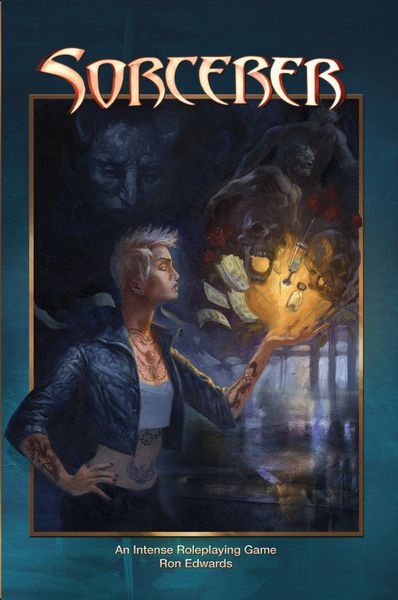I started to feel that I didn’t know roleplaying games well enough so I came up with the plan to read a roleplaying game corebook for every year they have been published. Selection criteria is whatever I find interesting.

The roleplaying game Sorcerer, by Ron Edwards, is massively influential and often cited in game design discussions. In addition to its design, this also has to do with the design community around the discussion site Forge, where Edwards was one of the prime movers.
I actually read The Annotated Sorcerer, where the 2001 game is accompanied by annotations by Edwards. It’s from 2013. The annotated version is extremely interesting. If I taught roleplaying games, I would definitely assign it as required reading. Edwards analyzes his own writing and design, gives it context, expands on the ideas in the original material and criticizes himself for failures.
The first thing that strikes me when I read the Sorcerer is that it positions itself as a challenger, an underdog, a young upstart ready to take on the orthodoxy of established roleplaying game design culture. Consider the first sentence of its preface:
Many role-playing games amount to not much more than a series of gorgeous coffee-table books.
At the very beginning, the game is not concerned with pitching its own concept. It wants to position itself in the roleplaying field. It reminds me of the “manifesto era” of Nordic Larp in the early 2000’s. The Manifesto of the Turku School and Dogma 99 were written in a punchy style to strike against established convention.
Reading those manifestos now, you have to remind yourself that they emerged in a specific context, against a specific play culture. This means that to really grasp what Dogma 99 is all about, it helps to be aware of the conventions of larp design in Norway in the late Nineties.
A lot of the rhetoric in Sorcerer and the annotations is built in a similar fashion. It opposes two things in particular:
- GMs who plan the content of a game session in advance.
- Roleplaying game books that contain a lot of setting material.
It’s hard for me to judge the context from which Sorcerer came since I have never been part of any of the play cultures Edwards inhabited. However, I have read a lot of Nineties roleplaying games so it feels like Sorcerer is a reaction against the World of Darkness games published by White Wolf. However, they’re never mentioned by name in the text, so this is conjecture.
So what is Sorcerer all about?
You play a character, a sorcerer. You can summon and bind demons to do your bidding. Thematically, the game is about the sordid and questionable means you use for your own ends. You want something, and you’re willing to use a demon to get it.
The game is very character-based, built around players creating their own characters with narrative hooks that then generate game content in a procedural fashion. The GM’s role is to improvise and react to the concepts set forth by the players.
In terms of style, Sorcerer is very Nineties. Its genre is the same modern day horror fantasy occupied by games like Vampire: the Masquerade, although it’s really laser-focused on the specific element of sorcerers who summon demons. In the game examples, there’s a lot of talk about guns and demons who look like hot babes.
The game’s tagline is: “An Intense Role-Playing Game” and for me, this is its most likable feature. It reads like something written by a person who has recently discovered that roleplaying games can elicit genuine, strong, complicated emotions and wants to spread the gospel. As someone who also loves that stuff, I’m all in!
The book has been written explicitly to eschew pre-designed setting material. Edwards justifies this choice by saying that coming up with all that during play is fun. To me, this feels like an update on the view Gary Gygax had at the early days of roleplaying, that it was useless to publish scenarios because GMs love to come up with those themselves.
The book also describes itself as not having been written for reading enjoyment. In one sense this is true, if you assume that reading enjoyment comes from narrative setting material. However, Edwards also sells himself short here because he’s a combative, entertaining writer. Despite (or because of) its hardass attitude, Sorcerer is fun to read.
The game is bookended by the essay Edwards is most famous for, System Does Matter. It’s interesting to read it now because at the time of its publication, it was doing the same thing as our Nordic manifestos: Rattling the orthodoxy! And like Nordic larp design, the design culture it gave birth to has since grown so hegemonic that others are now rebelling against it.
One thought on “A Game Per Year: Sorcerer (2001)”
Comments are closed.